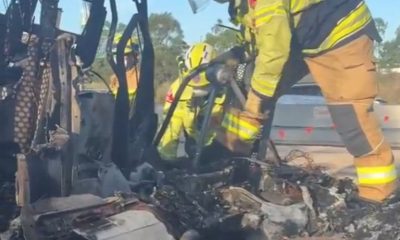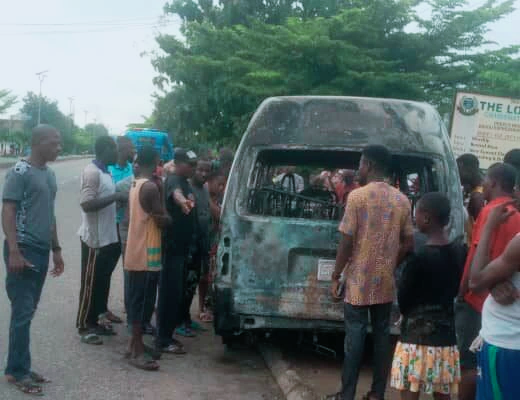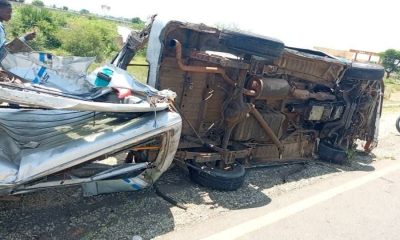Crash News
FRSC Corps Marshal Calls for Firearms: Will Guns Make Nigeria’s Highways Safer?

The debate over how best to enforce road safety laws in Nigeria took a dramatic turn when Corps Marshal Shehu Mohammed, head of the Federal Road Safety Corps (FRSC), declared that arming personnel may be the only way to effectively enforce traffic regulations on Nigerian highways.
Also Read: Fight Against Auto Theft: FRSC Recovers 35 Stolen Vehicles in Six Months
For decades, FRSC officials have relied on education, fines, and limited enforcement powers to maintain order on Nigeria’s notoriously dangerous roads. But with rising levels of non-compliance, violent resistance, and road crime, the Corps Marshal insists it may be time for a more militarized approach, one that arms his men for their own protection and to compel obedience from unruly motorists.
The statement has ignited a nationwide debate: Should traffic safety officers carry firearms? Would it improve enforcement or create more problems than it solves?
The Context: Nigeria’s Dangerous Highways
Nigeria’s highways are among the most chaotic and deadly in Africa. According to FRSC data:
- Over 40,000 road crashes are recorded annually.
- Human error accounts for more than 90% of accidents, including reckless driving, speeding, and drunk driving.
- Enforcement officers frequently encounter hostility, threats, and outright violence from drivers resisting arrest or fines.
In many parts of the country, traffic regulation isn’t just about preventing accidents, it’s about maintaining basic law and order on roads plagued by commercial transport chaos, aggressive motorists, and rising insecurity.
Why the FRSC Wants Firearms
Corps Marshal Mohammed’s position is based on three major concerns:
- Officer Safety
- FRSC personnel are often deployed along highways notorious for armed robbery, kidnapping, and bandit attacks.
- Many officers have been assaulted, injured, or even killed by violent motorists and criminals.
- Enforcement Authority
- Without arms, many drivers simply ignore officers, speeding off or physically resisting arrest.
- Arming personnel could act as a deterrent, forcing compliance with road regulations.
- Deterring Road Crimes
- The highways are increasingly a target for organized crime.
- An armed FRSC could support broader national security efforts on the roads.
In short, the Corps Marshal argues: “You cannot ask unarmed men to enforce laws in a violent environment.”
The Legal and Constitutional Debate
Currently, FRSC personnel are not authorized to carry firearms under Nigerian law. Their mandate is to:
- Enforce traffic regulations.
- Educate road users.
- Rescue accident victims.
- Collaborate with other law enforcement agencies.
For FRSC to bear arms, the National Assembly would need to amend existing laws and formally empower the Corps.
Critics warn this would blur the lines between traffic regulators and paramilitary forces, raising constitutional and ethical concerns.
Supporters: Why Arming FRSC Makes Sense
Advocates for arming FRSC personnel argue:
- Safety First: Officers have a right to defend themselves, especially on highways plagued by violent criminals.
- Deterrence: Armed presence would discourage reckless drivers and commercial transport operators from flouting laws.
- Parity with Global Norms: In many countries, traffic enforcement officers are part of the police and carry arms.
Some security analysts note that Nigeria’s road culture is unusually defiant, and only stronger enforcement can bring order.
Opponents: The Dangers of Guns on the Highways
On the other side, critics raise serious concerns:
- Risk of Abuse: Giving firearms to underpaid, overstressed FRSC personnel could lead to extortion, harassment, and misuse.
- Escalation of Violence: Instead of calming roads, firearms might trigger more violent confrontations between motorists and officers.
- Training Gaps: Without extensive firearms and conflict de-escalation training, arming FRSC could create more risks than it solves.
- Public Distrust: Nigerians already view many agencies as corrupt. Adding guns could deepen resentment rather than build respect.
Human rights groups argue that the solution lies in better training, technology, and judicial support—not militarization.
Global Comparisons: Do Other Countries Arm Traffic Officers?
- United States: Traffic enforcement is carried out by police officers, who are armed.
- United Kingdom: Traffic officers generally do not carry firearms, relying instead on cooperation with armed police when needed.
- South Africa: Many traffic officers are armed, given the high risk of violence on the roads.
- Kenya & Ghana: Traffic regulators often work alongside armed police but are not usually armed themselves.
The lesson? There is no single global standard, nations adapt based on local realities.
Alternatives to Arming FRSC
Critics suggest other measures that could strengthen FRSC without resorting to firearms:
- Stronger Collaboration with Police
- Deploy armed police units alongside FRSC patrols in high-risk zones.
- Technology-Based Enforcement
- Expand use of speed cameras, ANPR (automatic number plate recognition), and drones to reduce physical confrontations.
- Judicial Backing
- Ensure traffic offenders face swift prosecution, making resistance futile.
- Public Education
- Shift focus to changing driver behavior through awareness campaigns and stricter licensing.
- Protective Equipment
- Provide body armor, non-lethal weapons (tasers, batons), and secure patrol vehicles for officer safety.
The Public’s Voice
Public reactions to the Corps Marshal’s statement have been mixed:
- Commercial Drivers: Strongly opposed, fearing more harassment and bribe-seeking.
- Private Motorists: Divided—some welcome stronger enforcement, others fear abuse.
- Civil Society: Warns that arming FRSC could worsen human rights violations.
- Victims’ Families: Some support the move, believing stricter enforcement will save lives.
The debate reflects the deep distrust between Nigerians and law enforcement agencies.
What’s Next?
The Corps Marshal’s statement is likely to spark parliamentary debate in Nigeria. Any attempt to arm the FRSC would require:
- Legal amendments.
- Approval from the Presidency.
- Extensive retraining of personnel.
- Oversight mechanisms to prevent abuse.
Whether the idea gains traction or not, the conversation has already highlighted Nigeria’s road safety crisis—and the urgent need for stronger, smarter enforcement.
Roadking Analysis: A Crossroads for Nigerian Road Safety
The FRSC is caught in a paradox: expected to enforce laws on some of the world’s most chaotic highways, but denied the tools to defend themselves in dangerous situations. The Corps Marshal’s call to arms may be controversial, but it reflects a real frustration with the limits of current enforcement.
Still, arming FRSC officers should not be treated as a quick fix. Without systemic reforms, it risks creating more problems than it solves. Nigeria must decide:
- Will it pursue militarization of road safety?
- Or will it invest in technology, education, and judicial support as a long-term solution?
The answer will shape not just traffic enforcement, but the broader relationship between citizens and the state on Nigeria’s roads.
Conclusion: Guns, Safety, and the Future of the FRSC
The Corps Marshal’s declaration “My men need to bear arms” is more than a policy suggestion. It’s a statement about Nigeria’s roads, its drivers, and its struggles with law enforcement.
Whether or not FRSC officers ever carry firearms, one fact remains clear: Nigerian highways are dangerous, enforcement is weak, and lives are being lost every day.
The real challenge is finding a balance, protecting officers while ensuring that traffic enforcement serves the public good, not fear.
The question Nigeria must answer: Do guns belong in the hands of road safety officers or should the nation seek a smarter path to order on its roads?
Crash News
Six Dead, Fourteen Injured in Ebonyi Highway Crash: Reckless Overtaking Blamed
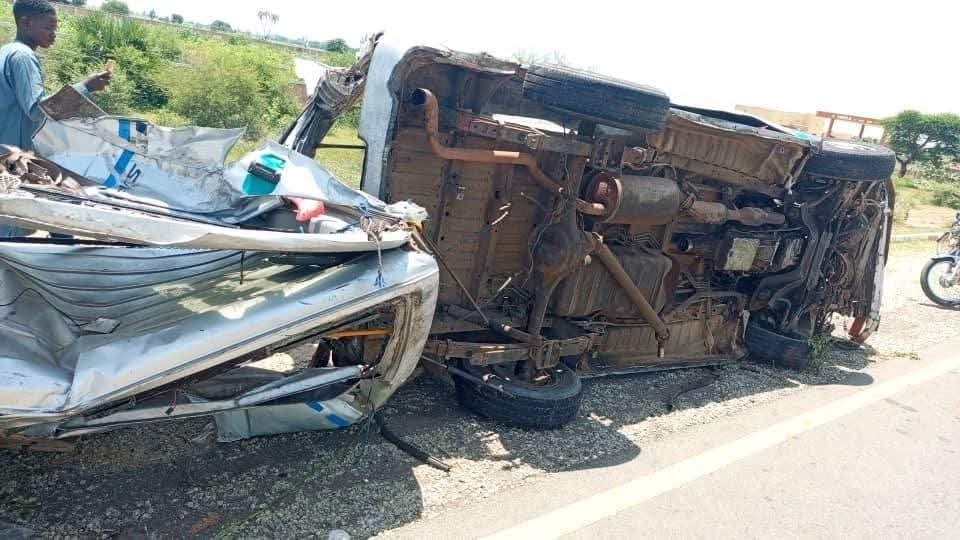
A dark cloud fell over Ebonyi State on the evening of October 17, 2025, when a fatal road crash along the Enugu–Abakaliki Federal Highway near the Nkalagu flyover claimed six lives and left fourteen others injured.
Also Read: Why Do So Many Car Accidents Happen at Night?
The tragic collision between a Toyota Hiace commercial bus and an articulated truck has once again brought to national attention Nigeria’s worsening crisis of reckless driving, dangerous overtaking, and systemic neglect of highway safety enforcement.
According to initial reports from the Federal Road Safety Corps (FRSC) and eyewitnesses, the crash occurred around 6:45 p.m., at a sharp bend notorious for accidents, where poor visibility and overspeeding have combined to create a deadly cocktail of danger for years.
The commercial bus, reportedly en route from Abakaliki to Enugu, attempted to overtake a slow-moving truck on a narrow stretch of the road when it lost balance and collided head-on with the oncoming articulated vehicle.
Eyewitness Accounts: “We Saw Death in Front of Us”
For survivors, the incident felt like a nightmare that unfolded in seconds.
Mr. Chigozie Nworie, a trader who was among the first responders, described the scene as “pure horror.”
“The bus was speeding too much. The driver tried to overtake a trailer carrying cement, but before he could return to his lane, another truck was coming from the opposite side. The collision was so loud people ran from nearby houses. We saw death in front of us,” he recounted to RoadKing.ng.
Among the victims were three men and three women, all of whom died instantly from the impact. FRSC officials at the scene confirmed that at least 22 persons were involved in the accident, 12 males and 10 females, many of them traders returning from a local market.
Several of the injured were rushed to Annunciation Hospital in Enugu and the National Orthopaedic Hospital, while others received treatment at nearby private clinics due to the overwhelming number of casualties.
Reckless Overtaking: The Silent Killer on Nigerian Highways
The FRSC Sector Commander in Ebonyi State, Corps Commander Anthony Okorie, described the crash as “avoidable and tragic.” He blamed it squarely on dangerous overtaking — one of the leading causes of fatal accidents in Nigeria.
“Drivers must learn patience. Dangerous overtaking remains one of the top three killers on our roads. This accident at Nkalagu was not an act of fate; it was caused by human impatience,” Okorie lamented.
Statistics from the National Bureau of Statistics (NBS) reveal that reckless overtaking contributes to over 15% of all fatal road crashes in Nigeria annually, ranking just behind speeding and mechanical failure. Yet, enforcement remains weak, with many commercial drivers disregarding road rules, emboldened by poor policing and lax penalties.
The Enugu–Abakaliki corridor has long been a red flag for traffic authorities. Despite its designation as a federal highway, sections of the road remain poorly maintained, with faded lane markings, sharp curves, and inadequate signage, all of which encourage confusion and risk-taking among motorists.
FRSC’s Response: Urgent Call for Discipline Behind the Wheel
In a press release on October 18, the FRSC reiterated its appeal for restraint among drivers, particularly commercial operators who ply the interstate corridors daily. The agency announced plans to intensify highway patrols across Ebonyi and Enugu States, deploying new mobile speed detection devices to monitor overspeeding in real-time.
The statement also noted that the remains of the deceased had been deposited at St. Vincent Morgue, while investigations into the cause of the crash were ongoing.
However, road safety advocates argue that reactive enforcement alone cannot solve a structural problem.
Mr. Frank Nnaji, founder of the Coal City Drivers’ Union, told RoadKing.ng that many of Nigeria’s commercial drivers lack proper certification and professional training.
“Most of these drivers never went through any driving school. They learn by trial and error. Some even drive under the influence of alcohol or drugs. We need a reform of the entire licensing system, not just arrests after accidents,” he said.
Families in Mourning: “Our Breadwinner Is Gone”
At Presco Junction, Abakaliki, the family of Mrs. Loveth Igwe, one of the victims, was inconsolable. Her husband, Mr. Emmanuel Igwe, told RoadKing.ng that she had boarded the bus to attend a church convention in Enugu and had promised to return the next morning.
“She called me before leaving Abakaliki and said she would be back on Saturday. That was the last time I heard her voice. They told me she died on the spot. How can I tell my children?” he said, his voice breaking.
In a nearby compound, Mrs. Grace Ude, mother of another victim, said her 27-year-old son had just started a new job as a mechanic apprentice in Enugu.
“He was full of hope. He even said this job would change our life. Now look at what impatience has done,” she said.
The six victims were buried in their respective hometowns after brief family ceremonies, with local pastors calling for repentance and discipline among motorists.
The Broader Picture: Ebonyi’s Troubled Highway Network
Ebonyi State has been struggling with a high rate of road crashes in recent years. Data from the FRSC Zone 9 Command (Enugu) show that between January and September 2025 alone, the state recorded 178 accidents, with 64 fatalities, a 12% increase from the same period in 2024.
Experts attribute this to a combination of poor road conditions, unregulated vehicle imports, and driver fatigue from long working hours.
The Nkalagu–Abakaliki–Enugu corridor, despite being one of the busiest trade routes in southeastern Nigeria, remains a notorious death zone.
Dr. Ifeanyi Mbah, a transportation analyst and lecturer at Ebonyi State University, told RoadKing.ng that Nigeria’s failure to design driver-centric roads contributes to these tragedies.
“Our roads are built for cars, not for people. We neglect proper signage, lighting, and speed-calming infrastructure. As long as we build highways that reward speed rather than discipline, we will continue to bury our citizens,” he explained.
Voices from the Road: Commercial Drivers React
At the Abakaliki Motor Park, tension was high as drivers discussed the latest tragedy.
Mr. Sunday Opara, a 42-year-old driver with over two decades of experience, blamed what he called the “rush culture” among young drivers.
“Most of these new drivers behave like they’re in a race. They drive like Formula 1 stars on a federal road. We older drivers are suffering because their recklessness gives everyone a bad name,” he said.
Another driver, Ali Musa, emphasized the need for FRSC to collaborate with transport unions to conduct regular awareness campaigns.
“Instead of waiting until people die, FRSC should enter our parks every month and talk to drivers. Let them teach us the real dangers of speed,” Musa added.
Government Reaction: Ebonyi Promises Road Rehabilitation
Following the public outcry, the Ebonyi State Government announced plans to begin emergency maintenance of accident-prone portions of the Enugu–Abakaliki Road.
Commissioner for Works, Chief Uchenna Eze, stated that while the highway is federally owned, the state cannot continue to watch lives lost needlessly.
“We will fill dangerous potholes, repaint lanes, and mount reflective signs at bends. We are also working with the FRSC to set up a mini rescue post near Nkalagu,” Eze said.
However, civil society groups criticized the government for its “reactionary approach,” arguing that repeated promises after every tragedy have done little to stop the carnage.
Call for Legislative Action
In the National Assembly, Senator Obinna Ogba (Ebonyi Central) has called for a motion urging the Federal Ministry of Works to expedite rehabilitation of all failing sections of federal highways in the Southeast. He also proposed stiffer penalties for reckless driving, including mandatory six-month suspension of licenses for drivers convicted of dangerous overtaking.
“Until we criminalize this kind of recklessness, Nigerians will continue to die on highways that are meant to connect communities, not destroy them,” he told reporters.
RoadKing Analysis: When Impatience Becomes National Tragedy
This Ebonyi incident is not an isolated event; it is part of a broader epidemic. In the last six months alone, Nigeria has witnessed a disturbing rise in fatal crashes attributed to overtaking and speeding from Ogun’s fiery tanker explosions to Yobe’s overspeeding carnage.
The pattern is clear: impatience, poor enforcement, and infrastructural neglect continue to turn highways into death corridors.
At RoadKing.ng, we have consistently highlighted that solving Nigeria’s road safety crisis requires a three-tier strategy:
- Driver Reform – Mandatory retraining and psychological evaluation for commercial drivers every two years.
- Engineering Solutions – Reconstruction of roads with proper lane markings, speed breakers, and reflective warnings at sharp bends.
- Institutional Accountability – Empowering FRSC to enforce road discipline without political interference or bribery.
Until these steps are fully implemented, tragedies like the Nkalagu crash will remain an all-too-familiar headline.
Crash News
Sydney Truck Inferno Paralyzes M7 Motorway, Sparks Global Road Safety Concerns
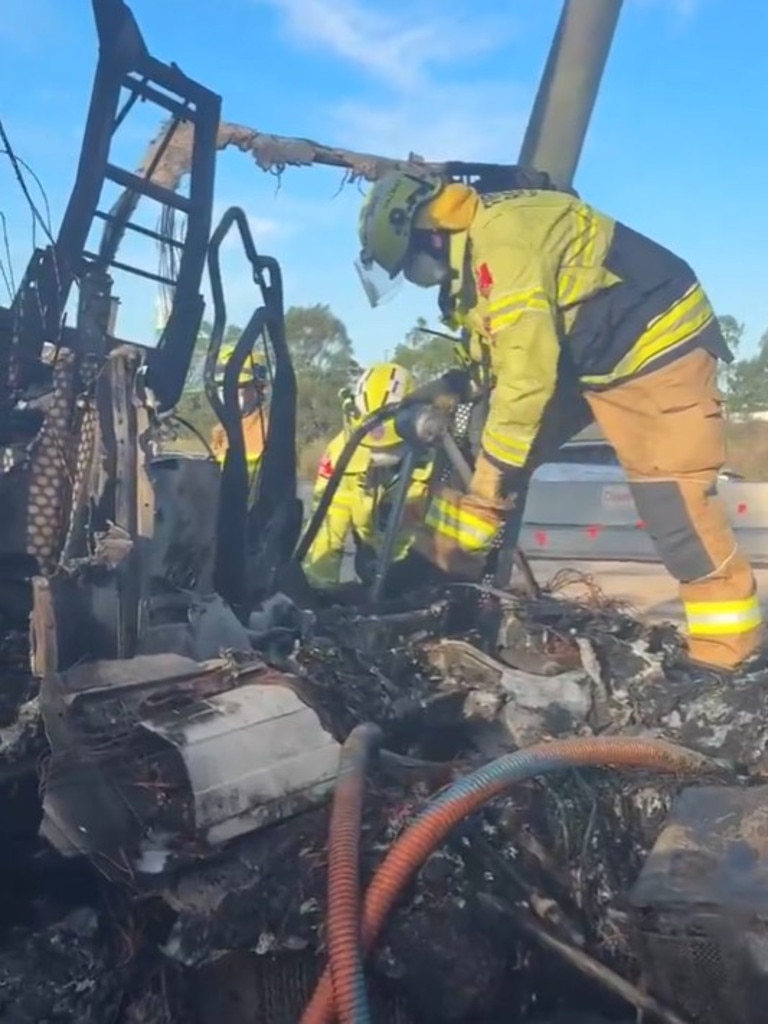
Chaos erupted early Friday morning on the M7 Motorway, one of Sydney’s busiest highway corridors, after a B-double truck burst into flames near Wallgrove Road, sending thick plumes of smoke into the air and forcing hours-long traffic lockdowns.
 Also Read: Eight Bangladeshi Workers Killed in Horrific Road Crash in Oman
Also Read: Eight Bangladeshi Workers Killed in Horrific Road Crash in Oman
Authorities say the truck was hauling mixed freight when its front trailer caught fire, quickly spreading to the cab. Eyewitnesses described scenes of panic as drivers abandoned their vehicles to escape the intense heat.
“It felt like an explosion at first, a loud bang, then the entire front of the truck went up in flames,” said Mark Henson, a motorist who narrowly avoided the inferno. “Everyone just started running.”
Emergency services, including the New South Wales Fire and Rescue (NSWFR) and Traffic Management Centre, rushed to the scene around 5:30 a.m. Local reports confirm that firefighters battled the blaze for nearly two hours before finally extinguishing it.
 Fortunately, no fatalities were recorded, though the truck driver suffered minor burns and smoke inhalation and was taken to Westmead Hospital for treatment.
Fortunately, no fatalities were recorded, though the truck driver suffered minor burns and smoke inhalation and was taken to Westmead Hospital for treatment.
The incident triggered massive gridlock, with northbound lanes of the M7 shut down until late morning. Commuters reported delays stretching over 10 kilometers, and detour routes through Eastern Creek and Horsley Park were quickly overwhelmed.
Sydney Transport Authority issued an emergency travel advisory urging motorists to avoid the route. Many businesses, including logistics and delivery operators, reported disruptions to early freight schedules.
“The M7 is a freight artery. When it’s blocked, the whole city feels it,” said Jason Wu, a logistics supervisor with TransMetro Haulage.
Fire investigators are yet to determine the exact cause of the blaze, but early suspicions point to a mechanical failure in the truck’s front axle or braking system, a recurring issue that has plagued heavy-duty vehicles operating under long-haul conditions in Australia’s heat.
NSW Police Crash Investigation Unit confirmed that it will conduct a full forensic assessment once the wreckage is cleared.
“Truck fires are not random,” said Senior Constable Erin Doyle. “They’re usually tied to poor maintenance, overloading, or worn-out brake systems, all preventable issues.”
While this tragedy unfolded in Sydney, its lessons resonate globally. Across Africa and Asia, where truck maintenance and safety inspections are often overlooked, similar fires have resulted in catastrophic loss of life.
According to the International Road Transport Union (IRU), poorly maintained heavy-duty trucks account for over 18% of road-related fire incidents worldwide.
In Nigeria, comparable incidents have occurred along Lagos-Ibadan, Onitsha-Owerri, and Lokoja-Abuja highways, often with deadly consequences.
“This Sydney fire is a mirror of what we see daily in Nigeria,” said Engr. Victor Eze, road safety consultant. “Until fleet management and preventive maintenance are enforced, these mobile bombs will keep rolling on our highways.”
By noon, Sydney’s Traffic Management Centre confirmed all lanes had reopened, though clean-up operations continued into the evening. Crews removed charred debris and inspected the asphalt for damage caused by the high heat.
NSW Fire and Rescue later commended motorists for maintaining safe distance and assisting with early evacuation, noting that the driver’s quick decision to pull over helped prevent a larger disaster.
This incident is another stark reminder that vehicle inspection and maintenance must not be treated as optional. Whether in Sydney, Lagos, or Dubai, negligence behind the wheel of a heavy-duty vehicle is a potential death sentence for innocent road users.
*SCRIPTURES FOR FRIDAY 10TH OCTOBER 2025*
* ISAIAH 50-51*
* COLOSSIANS 3:1-25,4:1*
Crash News
Late-Night Crash on Abuja–Lokoja Highway Leaves Four Feared Dead
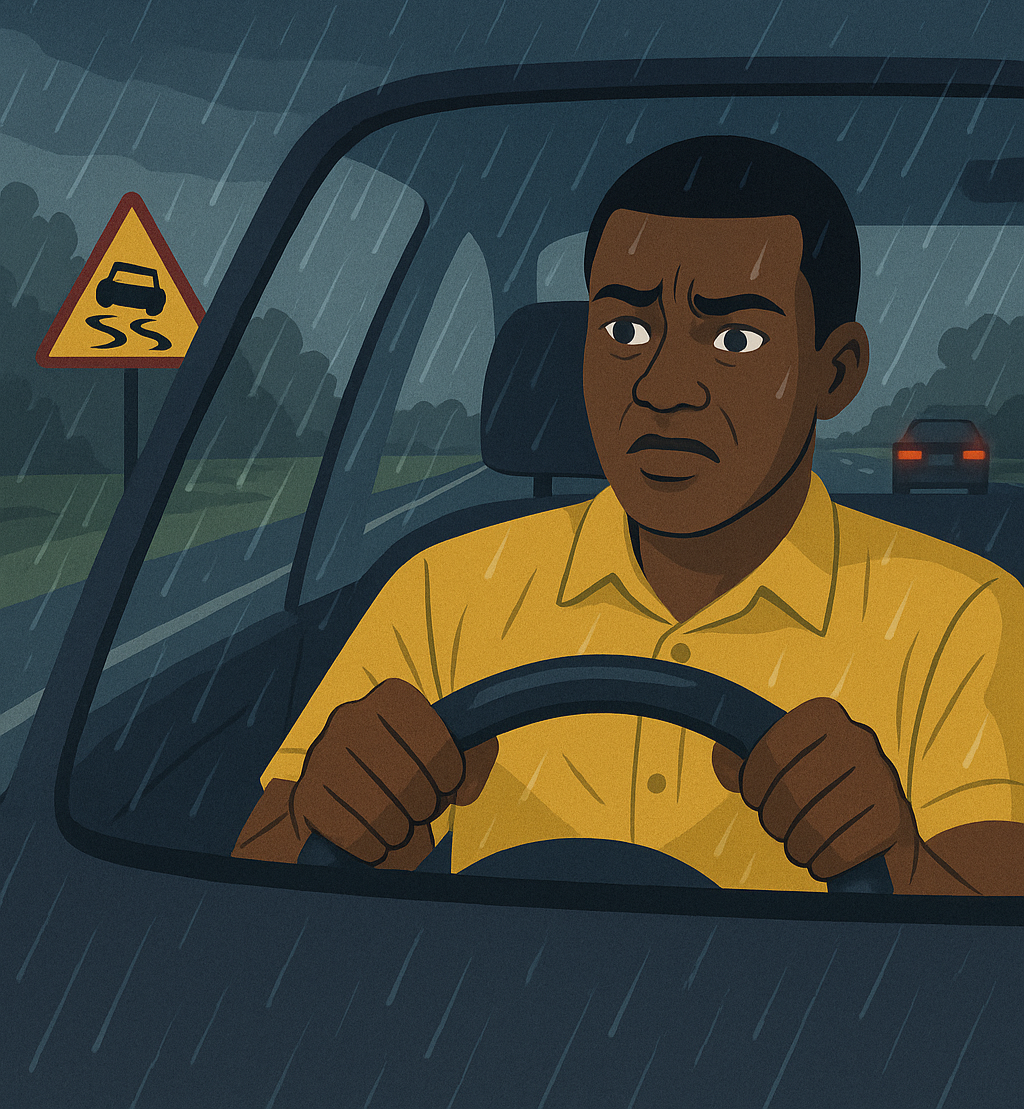
Unconfirmed reports reaching RoadKing.ng suggest that a late-night collision along the Abuja–Lokoja Expressway has left at least four persons feared dead, with several others injured. The crash reportedly occurred near Gegu village around 10:40 p.m. on Tuesday, October 7, 2025.
Also Read: Lokoja-Abuja Road: Why Accidents Are Constant Here
According to eyewitness accounts gathered at the scene, a commercial bus allegedly attempted to overtake a fuel tanker on a dangerous bend before colliding head-on with an oncoming trailer. The impact reportedly triggered an explosion that engulfed both vehicles in flames.
While official confirmation from the Federal Road Safety Corps (FRSC) and Kogi State Police Command was still pending at press time, residents in the area say emergency responders and local volunteers rushed to the scene to assist victims trapped in the wreckage.
“We saw fire everywhere. The bus and trailer burned completely before the FRSC arrived,” said one witness, Bello Ibrahim, who lives close to the accident point.
FRSC Reacts (Awaiting Official Report)
When contacted by RoadKing.ng, a senior FRSC officer at the Kogi Command who preferred anonymity stated that details of the incident were still being verified.
“We have sent a team to the site, but we cannot confirm the number of casualties yet. We will issue a formal statement after full assessment,” the officer said.
Recurring Danger on Abuja–Lokoja Expressway
The Abuja–Lokoja Expressway has long been one of Nigeria’s deadliest routes. Frequent crashes, especially involving tankers, trailers, and commercial buses, have turned it into a hotspot for fatal road incidents.
A 2024 report by the National Bureau of Statistics (NBS) ranked Kogi State among Nigeria’s top five states with the highest road fatalities, with the Abuja–Lokoja axis accounting for nearly 60% of recorded deaths.
Transport safety experts have repeatedly blamed reckless overtaking, poor road markings, and inadequate enforcement as key contributors.
“We have lost too many lives on this road,” said Engr. Victor Eze of the Safe Highways Initiative, calling for automated speed cameras, improved lighting, and stricter commercial driver certification.
Public Concern Grows
Motorists using the route expressed anger over the frequency of accidents.
“Every week, there’s one tragedy or another. The government must fix this road and regulate these drivers,” said Hassan Adamu, a long-distance truck driver.
As at the time of this report, traffic had been restored after hours of gridlock, though emergency teams continued clearing debris from the scene.



